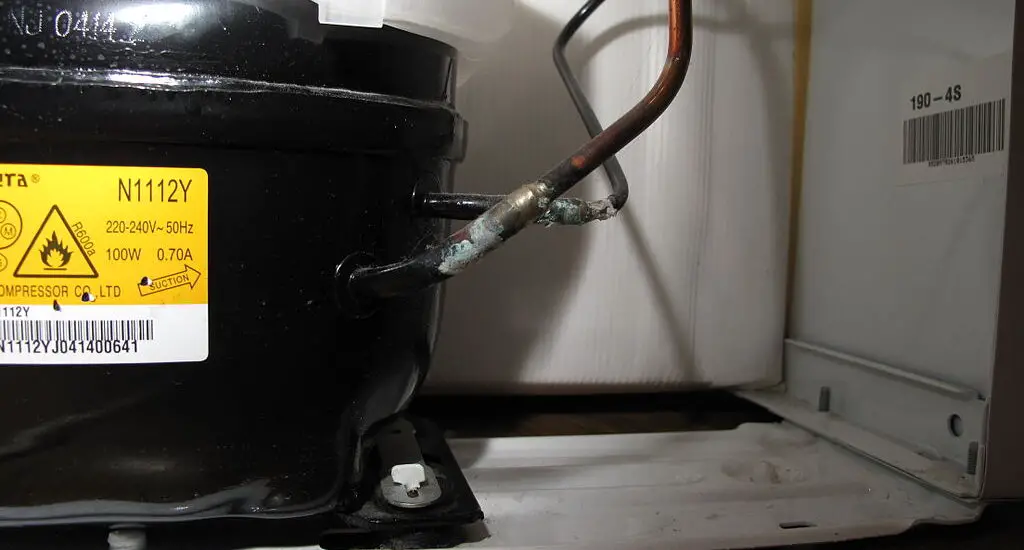Is your fridge compressor shaking? This can throw you for a loop, right? In this guide, we’ll look into what might be causing this unnerving issue, how to diagnose it, and what you can do to fix it.

Table of Contents
Understanding the Fridge Compressor
Before we get into the shaky details, we need to understand what a fridge compressor is and what it does.
What is a Fridge Compressor?
The fridge compressor is essentially the heart of your refrigerator. It’s the engine that drives the refrigeration cycle, keeping your food cool and fresh. It does this by compressing the refrigerant and circulating it through the cooling system.
Normal Operations of a Fridge Compressor
So, what’s normal for a fridge compressor? Typically, it emits a low humming noise and stays pretty much still. It cycles on and off throughout the day to maintain the fridge’s temperature. So, if you hear a bit of a hum and then silence, that’s just your compressor doing its job. But if it starts shaking like a leaf, that’s a different story!
Why Your Fridge Compressor is Shaking
Now that we know what’s normal, let’s talk about why your fridge compressor might start its own rock band.
Unbalanced Compressor
An unbalanced compressor can make your fridge do the jitterbug. It happens when the internal components are worn or damaged. You can almost think of it like a washing machine with an uneven load. It gets off-kilter and starts to shake.
Loose Mounting Bolts
Loose mounting bolts can also give your compressor a case of the shakes. Think of these bolts as the seatbelt for your compressor. If they’re not tight, the compressor can start to move around, especially when it’s working hard.
Failing Compressor Motor
If your compressor motor is failing, it might shake like a leaf in a hurricane. The motor is the power source of the compressor. If it’s struggling, it might not run smoothly, leading to the shake, rattle, and roll.
Check out these other related articles…
Fridge Compressor vs AC Compressor: A Detailed Comparison
Refrigerator Compressor Pressure: Your Comprehensive Guide
Fridge Compressor Pinout: Your In-Depth Guide
Refrigerator 10-Year Compressor Warranty: Ultimate Guide
Fridge Compressor Overload Keeps Tripping: Reasons & Fixes
Diagnosing a Shaking Fridge Compressor
Alright, we’ve got our suspects. Now, let’s play detective and find out what’s causing your fridge compressor to shake.
Visual Inspection
First up, visual inspection. Take a peek at your compressor and the mounting bolts. Are they loose? Do you see any signs of wear or damage? Keep in mind that some issues might not be visible to the naked eye. But it’s a good starting point.
Listening to the Compressor
Next, lend an ear to your compressor. Does it sound like it’s struggling or making odd noises? A different sound can point towards a failing motor. It’s like listening to a car engine – sometimes, you can hear when something’s not right.
Using a Compressor Tester
A compressor tester can be your best friend when diagnosing fridge issues. It’s a device that checks the motor’s electrical components.
How to Fix a Shaking Fridge Compressor
So you’ve figured out why your compressor is shaking. Now, it’s time to get down to business and fix it.
Balancing the Compressor
First, if your compressor is unbalanced, you’ll need to balance it out. This is not an easy DIY job and often requires professional assistance. The internal parts of the compressor might need to be repaired or replaced to restore balance. If you’re not up to the task, it’s okay, we’ll talk about when to call a pro later.
Tightening Loose Bolts
If loose bolts are the culprit, grab your trusty wrench and get to tightening. Make sure the compressor is securely fastened and isn’t moving around. Remember, though, don’t overtighten – you don’t want to strip the threads or damage the mounting brackets.
Replacing a Failing Compressor Motor
If the motor is failing, you might need to replace the compressor entirely. This is a big job and can be pretty expensive. You’ll need to consider whether the cost of the new compressor and the labor to install it is worth it, or if you might be better off replacing the whole fridge.
When to Call a Professional
DIY fixes are great, but they’re not for everyone or every situation. If you’re feeling unsure or overwhelmed, it’s time to call in the pros.
Here’s the thing: refrigerators are complex machines, and working on them can be risky if you don’t know what you’re doing. You could end up damaging the fridge further or even hurting yourself.
So if you’re not 100% confident, don’t risk it. A professional can diagnose and fix the issue safely and efficiently. Plus, they can give you peace of mind knowing that the job was done right.